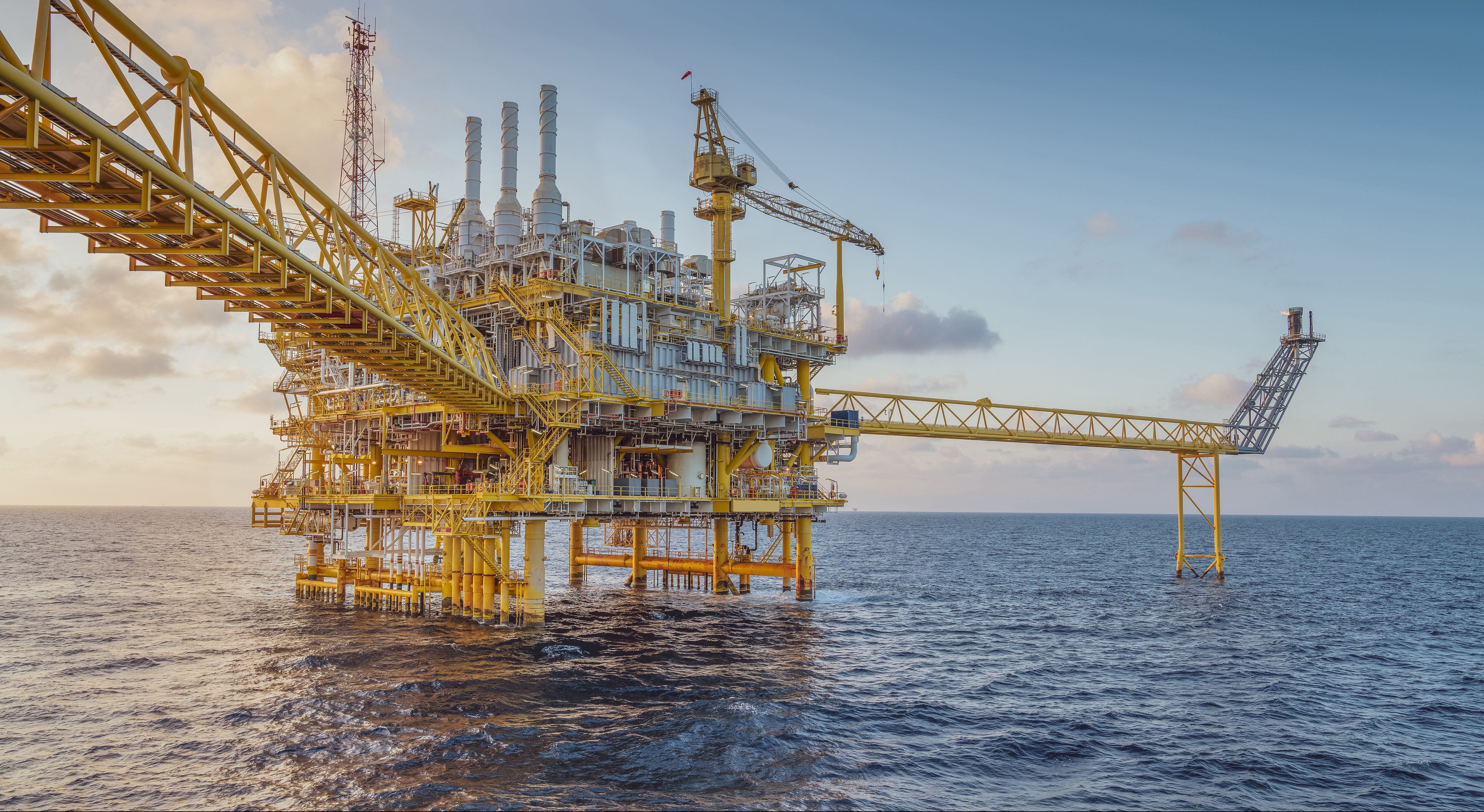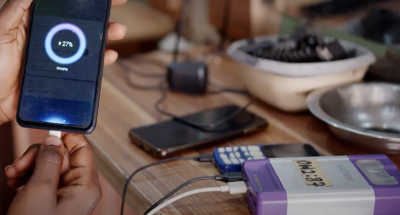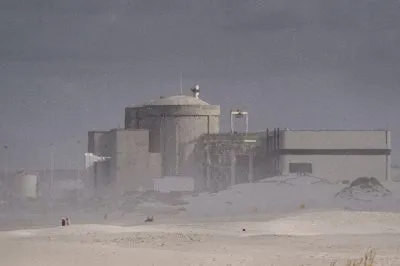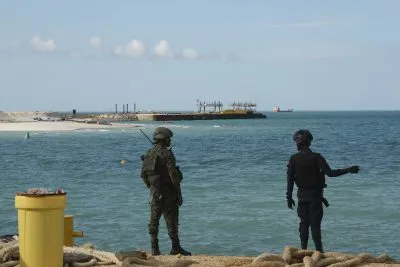The area of coastline shared between Mauritania and Senegal is rich in wildlife, as a thousand miles of Sahara desert gives way to soil watered by the Senegal river, providing respite to millions of waterbirds on their journey between Africa and the Arctic.
It’s an area that’s also rich in hydrocarbons, after lucrative gas basins were discovered six years ago on the edge of the world’s largest cold-water coral reef, a discovery which set in motion the $4.8bn Greater Tortue Ahmeyim (GTA) project led by British oil and gas giant BP, in partnership with American deepwater exploration company Kosmos Energy and other firms.
“It is precisely the kind of gas province that we want to invest in. It is long term. It is large scale. And it is highly competitive,” says BP’s CEO Bernard Looney.
After Covid caused a year’s delay to the project, construction started on phase 1 this year, requiring BP to build a 1km long liquefied natural gas (LNG) terminal 10km from the shoreline.
The terminal will process vast volumes of gas lying 2,850m underneath the ocean, 125km out to sea, which will be extracted from drilled wells and moved along flowlines to a modular floating LNG production system. It will then be made ready for export to Europe and beyond, and for use in the domestic markets of Mauritania and Senegal.
The first gas from GTA 1 is expected online in 2023, bringing heavily reduced electricity costs and a much hoped for public spending spree.
Transformative effect on economy
Mauritania’s government hopes that the minimum $19bn forecast in additional government revenues over the next three decades will have a transformative effect on a nation with a GDP of $7.6bn (2019). GDP has nearly quadrupled since 2000, but in the same period Mauritania slid from 135th place to 157th on the UN’s Human Development Index, an indicator which takes into account factors including average income, life expectancy and education.
Now Mauritania and Senegal are set to become world-class LNG centres, says Palzor Shenga, a senior analyst at Norwegian Rystad Energy. GTA phase 1’s gas forecasts predict production of about 3m tonnes per annum by 2025, although that figure has been revised down because of BP’s Covid-enforced capital expenditure reductions.
Revised plans and cuts in proposed development costs for GTA phase 2 will make the gas fields “the world’s most competitive” brownfield LNG expansion project, Shenga says, boosting government revenues further. Spread over 33,000 sq km, the Greater Tortue Ahmeyim field is estimated to contain at least 15 trillion cubic feet of recoverable gas reserves, and BP says the field has a 30 to 50 year production potential.
Mauritania has been highly dependent on iron ore mining and farming the 0.5% of its land that is suitable for agriculture, but now boasts the second largest gas reserves in relation to its 4.5m population in the whole of Africa after Equatorial Guinea.
Adnane Allouaji, Middle East and Africa analyst at the Economist Intelligence Unit (EIU), expects the government to “invest heavily in President Ghazouani’s many socio-economic projects”.
Finance minister Mohamed Lemine Ould Dhehby recently said there will be a “grand revolution” in spending, with specifically targeted investment in agriculture, fishing and infrastructure in a bid to reduce poverty and chip away at the 21% youth unemployment rate.
Following on from Mauritania’s first democratic transition of power in 2019, the political elite has been further shaken this year, with the former president, Mohamed Ould Abdel Aziz, jailed after failing to report to a judge as part of an ongoing corruption investigation.

President Ghazouani will maintain an anti-corruption stance and take action against elites opposed to it, says Allouaji.
“He has continued to emphasise his commitment to tackling social injustices, a message clearly aimed at the Haratine [Arabic speakers in the north of the country] and black southerners who often feel neglected by the government, in an attempt to reduce the risk of popular uprisings. And so prosperity will be ‘equitably shared’, but the real test will now lie ahead, in implementation.”
Environmental fears
Environmental groups say that GTA – the deepest subsea project BP has ever tackled – is akin to playing Russian roulette with a marine environment that continues to change in unpredictable ways.
July brought the unexplained deaths of dozens of dolphins and turtles whose carcasses washed up along the shore near Saint-Louis in Senegal, and a team of oceanographers in Dakar are currently researching the rise in ocean acidification.
Unearthed, a Greenpeace UK-funded platform, says BP’s plans for GTA could use up 1% of the world’s remaining 1.5C carbon budget by 2100, and damage the 200,000-year-old cold-water coral reef ecosystem, which houses numerous fish, crab, giant clams and sponges, and whose waters accommodate vulnerable shark, turtle, and whale species.
Unearthed say the pipeline will snake through different sections of the reef, 600m away on both sides, which is close enough to disturb sediment during the pipeline burial, potentially suffocating live coral and destroying biodiversity.
Artisanal fisherman fear spills of poisonous condensate, which is a byproduct of natural gas that condenses into a liquid after it’s extracted from the well, say Greenpeace. Scientists warn that a condensate spill following a well eruption could affect the maritime areas of eight or nine countries in the region, although BP say their emergency response and spill contingency plans would be activated in such an event.
“Fish is the number one protein for communities, and it’s a source of livelihood for many, and this industrial operation can destabilise the ecosystem even further, and dilute the number of fish available for human consumption, to the point of no return,” says Awa Traoré, a Greenpeace ocean campaigner based in Dakar.
Greenpeace is calling for Africa to “leap over the dark age of fossil fuels” and invest in renewable energy. “Otherwise proud fishing communities facing any future catastrophic spill would go from being self-sustained and dignified for centuries to becoming dependent on aid, through no fault of their own,” says Traoré.
Chance to adopt best practices
For Bocar-Alpha Ba, at not-for-profit organisation Invest In Africa (IIA), the next decade of gas exploration off Mauritania’s coast offers a golden opportunity for the business community to develop international best practices.
“The GTA can trigger the development of our country based on good governance in coordination with the private sector, the key player to change our country from the ground up. The gas infrastructure will create jobs but it will also lead to skills development which will outlast the project’s lifespan, creating opportunities for Mauritanians in different industries with currently limited local capacity.”
As BP and its partners build one of Africa’s most ambitious LNG projects to date, teams of engineers and technicians will be created, and a small army of logistics and hospitality workers, truck drivers and cleaners, waste management clients and administrative support services will be employed, providing jobs for Mauritanians, says Ba.
The industrial sector is currently small, requiring the Mauritanian diaspora to play a significant role in the economy. Longer term, tax revenues generated from gas should provide the government with new revenue streams to invest in growth, which IIA says will extend into micro-finance, and wider economic independence and opportunities.
“Setting up Mauritania as an energy hub will be fundamental to economic growth and increased energy security in the country and wider hinterland. But as Africa and the world embark on a green energy revolution, the importance of gas as a transition fuel will strengthen Mauritania’s position as a supplier, not to mention green hydrogen for which Mauritania is extremely well placed,” says Ba.
Biodiversity action plan
BP have said that the company is developing an additional biodiversity action plan for the project to be peer reviewed. If managed properly some scientists say that BP’s extractive plans could help replenish fish stocks and wide sections of the coral reef.
“Large and safe security zones around BP’s installations protected by a pilot ship warning off fishing vessels would give these exceptional marine ecosystems a break from fishing impacts,” says Sandra Kloff, a marine biologist who has worked in the region for 25 years.
“BP may even offset the CO2 it will put on the market with the GTA gas, by saving marine sediments from bottom trawling. Marine sediments in this upwelling region cumulate very high levels of carbon and are able to stock it away for thousands to millions of years, provided they are not raked up by bottom trawlers.”
A recent study published by Nature, a science journal, highlighted the yearly CO2 emissions caused by trawlers raking up marine sediments.
Kloff and her colleagues are petitioning BP to lay the miles of flowlines on the sea bed instead of burying them to protect the coral, which could incentivise the Mauritanian and Senegalese governments to exclude international trawlers nearby. This will have the knock-on effect of increasing fish stocks for artisan fisherman, which will lower the price of fish at market.
The oil and gas companies which are more proactive towards protecting biodiversity and fishing communities can change the game, says Kloff, arguing they have a moral responsibility to go beyond their corporate policy of creating net zero impact.
“BP could level the playing field and give these fishermen exclusive access to a part of their security zones. And as opposed to industrial fleets, their gear is unlikely to do harm to the installations,” said Kloff.
A benefit for all?
As Mauritania and Senegal start walking the tightrope of gas revenues, environmentalists are likely to increase the pressure to ensure they protect the region’s crucial biodiversity. Others say a balance can be struck that benefits all parties.
“The sector will require huge amounts of investment to drive it forward in Africa, but the potential capacity of gas for Mauritania and Senegal is substantial. The framework thus far appears to be beneficial to all parties involved,” says Conor Ward, oil and gas analyst at GlobalData.
Want to continue reading? Subscribe today.
You've read all your free articles for this month! Subscribe now to enjoy full access to our content.
Digital Monthly
£8.00 / month
Receive full unlimited access to our articles, opinions, podcasts and more.
Digital Yearly
£70.00 / year
Our best value offer - save £26 and gain access to all of our digital content for an entire year!

 Sign in with Google
Sign in with Google 





